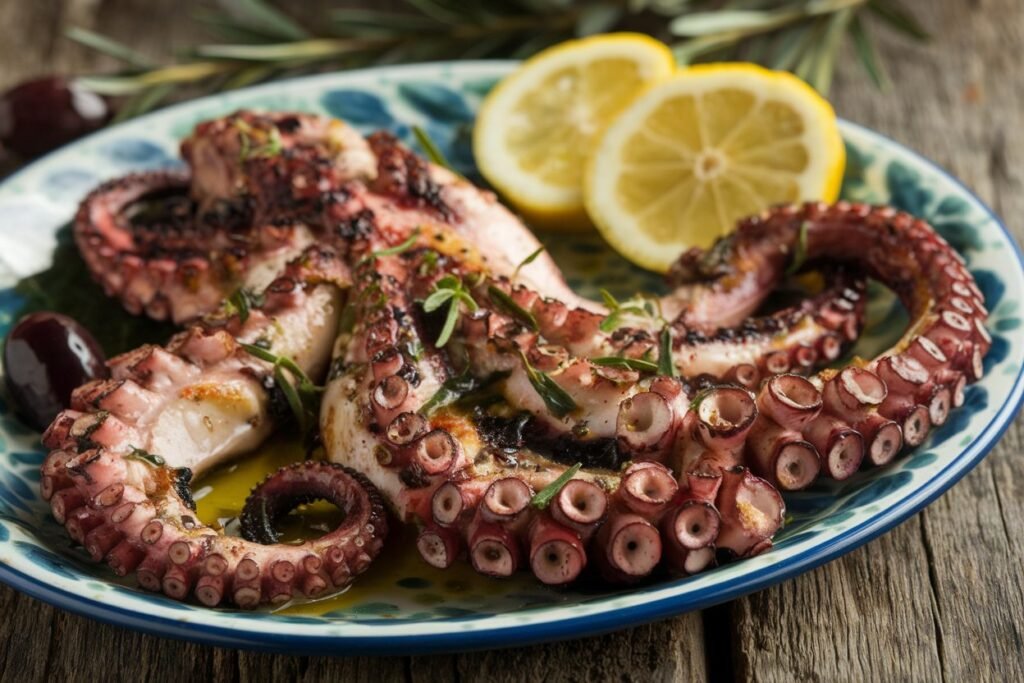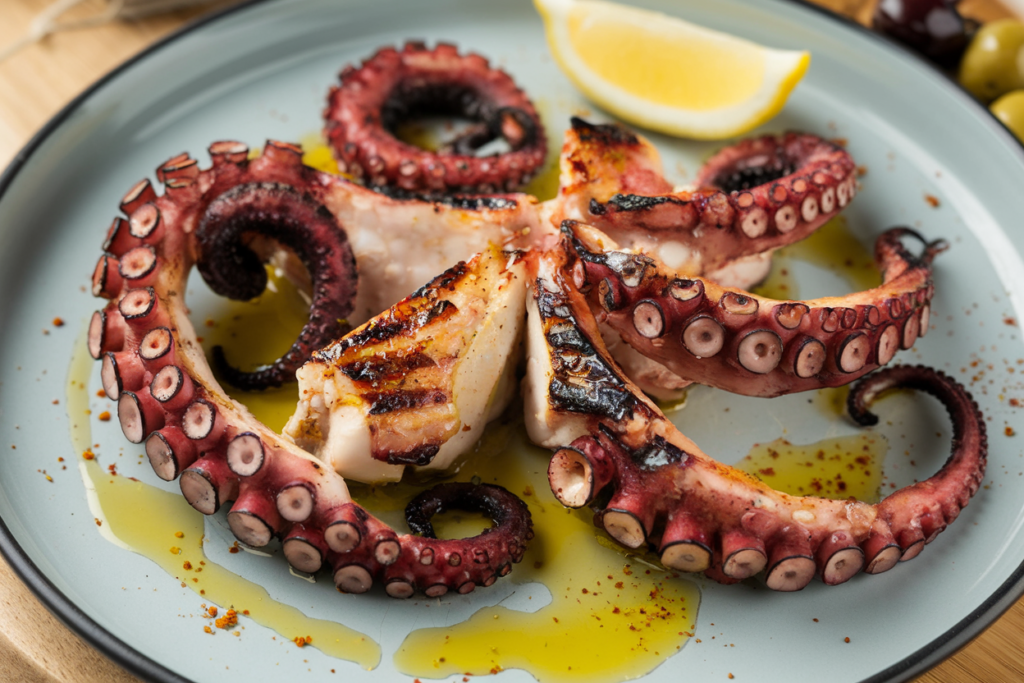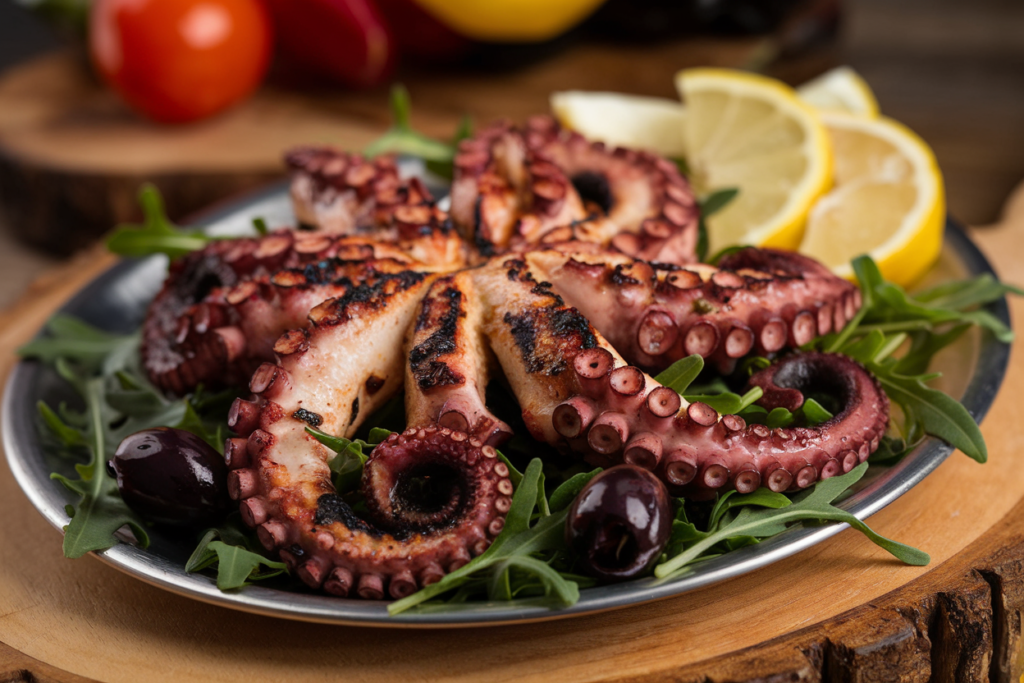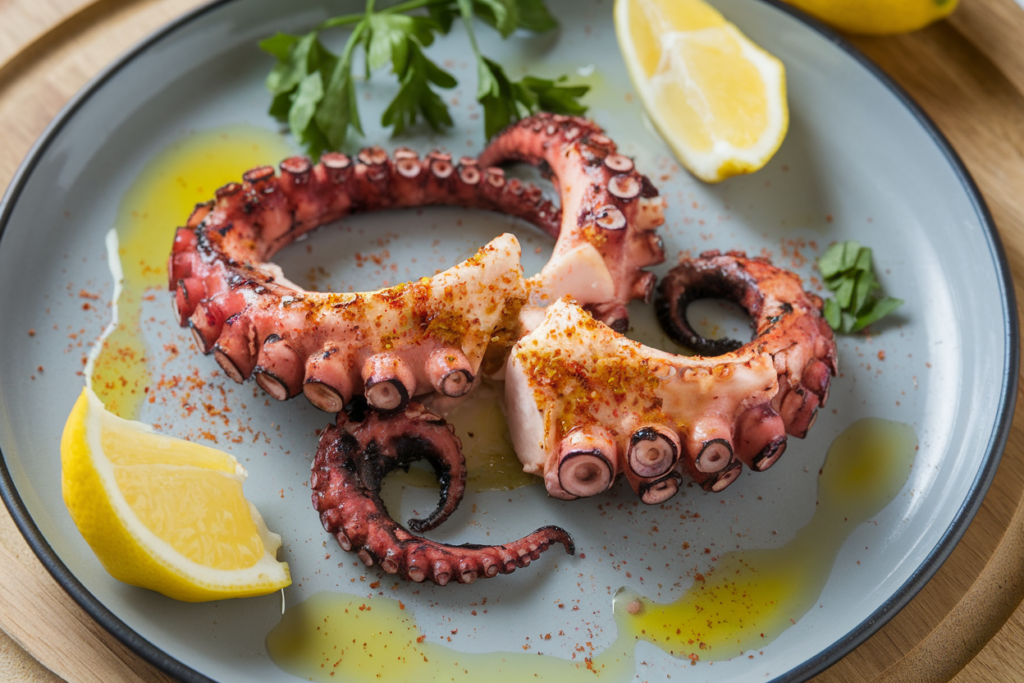When you think of Portuguese cuisine, the Lagareiro Octopus, or Polvo à Lagareiro, is a dish that stands out. It’s not just a meal; it’s a celebration of flavors and traditions that reflect Portugal’s rich coastal heritage. This seafood masterpiece combines tender octopus with the vibrant essence of olive oil, garlic, and herbs, creating a dish that’s loved by locals and visitors alike. Whether you’re enjoying it at a family gathering or a festive occasion, Lagareiro Octopus brings people together over a shared love for good food.
Key Takeaways
- Lagareiro Octopus is a traditional Portuguese dish that showcases octopus cooked with olive oil and garlic.
- The preparation involves boiling the octopus for tenderness and then baking it to achieve a crispy texture.
- This dish is often served with smashed potatoes and can include various herbs for added flavor.
- Cultural significance is tied to family gatherings and celebrations, making it a beloved choice in Portuguese cuisine.
- You can find excellent Lagareiro Octopus in many coastal restaurants across Portugal, each with its unique twist.
The Essence Of Lagareiro Octopus

Historical Significance
The name ‘Lagareiro’ itself is super important. It comes from the word for an olive oil producer or miller. This shows how much olive oil matters in Portuguese cooking, especially in this dish. It’s like a nod to Portugal’s liquid gold, giving every bite that special Mediterranean vibe.
Culinary Tradition
Lagareiro Octopus is more than just a meal; it’s a real taste of Portuguese tradition. It’s usually made with octopus, but sometimes they use cod instead. The ‘lagareiro’ style means everything gets tossed in olive oil with herbs. It’s a simple way of cooking that really brings out the flavors. The dish requires time and care, respecting each ingredient to achieve the perfect balance of flavors and textures.
Cultural Identity
Lagareiro Octopus is a big deal in Portugal. It shows how connected the country is to the sea and the land. It’s a dish that’s been passed down through families for generations. Whether it’s a holiday or just a regular dinner, it’s a way to enjoy life’s simple pleasures and celebrate Portuguese food. It’s like a trip to Portugal without leaving your table.
This dish is a symbol of Portuguese pride and passion. It represents the nation’s culinary heritage and its deep connection to the sea. It’s a reminder of the importance of family, tradition, and the simple joys of life.
Here’s a quick look at why it’s so special:
- Represents Portuguese culinary heritage
- Highlights the importance of olive oil
- Connects to the sea and land
- Celebrates family and tradition
Preparation Techniques For Lagareiro Octopus
Cleaning and Boiling
Okay, so you wanna make Lagareiro Octopus? First things first: the octopus needs a good cleaning. Really good. You want to make sure you get rid of any sand or grit. Some people remove the skin, some don’t – it’s up to you. Then comes the boiling. Don’t add salt to the water at this stage, as it can toughen the octopus. Throw in a whole onion for extra flavor. The boiling time depends on the size, usually around 45 minutes to an hour, until it’s tender but not mushy.
Seasoning for Tenderness
Getting that perfect tenderness is key. Some folks swear by beating the octopus with something heavy before cooking, but honestly, slow cooking works just as well. You can simmer it in its own juices with some onion, garlic, a bay leaf, and a splash of wine or vinegar. This not only tenderizes the octopus but also infuses it with flavor. Remember to only add salt after boiling to keep it tender!
Baking to Perfection
Now for the fun part: baking! Preheat your oven to around 350°F (180°C). In a baking dish, arrange the boiled octopus pieces with smashed potatoes. Drizzle generously with olive oil – and I mean generously. Add crushed garlic cloves, paprika, pepper, and bay leaves. Bake for about 15 minutes, until the octopus is slightly charred and the potatoes are crispy on the outside. A final sprinkle of fresh parsley or cilantro adds a nice touch.
Baking the octopus is where the magic happens. The high heat and olive oil create a crispy exterior while keeping the inside tender. Don’t be afraid to let it get a little color; that’s where the flavor is.
Flavor Profile Of Lagareiro Octopus

The Role Of Olive Oil
Olive oil isn’t just an ingredient in Lagareiro Octopus; it’s the ingredient. It’s the foundation upon which the entire flavor profile is built. The dish gets its name from “lagareiro,” referring to someone who makes or works with olive oil. A generous amount of high-quality Portuguese olive oil is used, not just for cooking, but also as a finishing element, drizzled over the octopus and potatoes right before serving. This ensures a rich, smooth mouthfeel and a distinct, fruity aroma that complements the seafood perfectly. It really does bring that Mediterranean magic to the dish. The essence of Portuguese cuisine is captured in this dish.
Herbs and Aromatics
While olive oil provides the base, herbs and aromatics add layers of complexity. Garlic is almost always present, often crushed and scattered throughout the dish to infuse the oil and potatoes with its pungent flavor. Parsley or cilantro are commonly used as a fresh garnish, adding a bright, herbaceous note that cuts through the richness of the oil. Some variations might include bay leaves during the boiling process to subtly flavor the octopus. It’s a simple combination, but it works wonders.
Texture and Taste
The texture of Lagareiro Octopus is just as important as the taste. The octopus should be tender, but not mushy, with a slight char from baking. The potatoes should be crispy on the outside and soft on the inside, providing a satisfying contrast. The overall taste is a balance of savory, salty, and slightly sweet, with the olive oil tying everything together. It’s a comforting and satisfying dish that showcases the natural flavors of the ingredients. The traditional dish is a culinary masterpiece.
The beauty of Lagareiro Octopus lies in its simplicity. It’s not about fancy techniques or exotic ingredients; it’s about using high-quality ingredients and letting their natural flavors shine through. The combination of tender octopus, crispy potatoes, fragrant olive oil, and fresh herbs creates a dish that is both comforting and sophisticated.
Here’s a breakdown of the key flavor components:
- Octopus: Savory, slightly sweet, with a firm but tender texture.
- Potatoes: Earthy, starchy, with a crispy exterior and soft interior.
- Olive Oil: Rich, fruity, smooth, and slightly peppery.
- Garlic: Pungent, aromatic, and slightly sweet when cooked.
- Parsley/Cilantro: Fresh, herbaceous, and bright.
Serving Suggestions For Lagareiro Octopus

Accompaniments and Sides
Lagareiro Octopus is a star on its own, but the right sides can really make it shine. Traditionally, you’ll find it served with the potatoes it’s baked with, which are usually smashed and soaked in all that delicious olive oil and garlic. But don’t stop there! Consider these options:
- A simple green salad with a light vinaigrette can cut through the richness.
- Roasted vegetables like bell peppers or onions complement the octopus’s flavor.
- Some crusty bread is essential for soaking up every last bit of the herbed oil.
Presentation Tips
Presentation can elevate the whole dining experience. Here are a few ideas to make your Lagareiro Octopus look as good as it tastes:
- Arrange the octopus tentacles artfully on the plate, maybe coiled or fanned out.
- Drizzle extra olive oil and sprinkle fresh herbs like parsley or cilantro over the top.
- Use colorful vegetables as a garnish to add visual appeal.
Serving the dish on a rustic wooden board can add a touch of authenticity and charm. It’s all about creating a feast for the eyes as well as the palate.
Pairing with Beverages
Choosing the right drink can really bring out the flavors of Lagareiro Octopus. A crisp, dry white wine is a classic choice. Here are some other options:
- Vinho Verde: A light, slightly effervescent Portuguese wine that pairs well with seafood.
- Alvarinho: Another Portuguese white wine with citrusy notes that complement the octopus.
- A light-bodied red wine, like a Pinot Noir, can also work if you prefer red wine.
| Beverage | Flavor Profile | Why it Works |
|---|---|---|
| Vinho Verde | Light, citrusy, slightly effervescent | Complements the seafood without overpowering it. |
| Alvarinho | Aromatic, citrusy, mineral | Enhances the flavors of the octopus and herbs. |
| Light Pinot | Earthy, fruity, low tannins | Provides a subtle contrast without clashing with the dish’s richness. |
Regional Variations Of Lagareiro Octopus
Differences Across Portugal
Lagareiro octopus, while a staple across Portugal, isn’t immune to regional tweaks. You’ll find that the Beiras region, often credited as its birthplace, sticks closely to tradition, emphasizing simplicity and the quality of ingredients. Head south to the Algarve, and you might encounter versions with a touch more spice, reflecting the region’s Moorish influences. In the north, portions tend to be heartier, a nod to the colder climate and the need for more substantial fare. It’s fascinating how a single dish can morph as it travels across the country.
Influences from Coastal Regions
Unsurprisingly, coastal areas put a huge emphasis on the freshness of the octopus. The closer you are to the sea, the more likely you are to find octopus caught that very day. This impacts the flavor and texture significantly. Coastal chefs often experiment with different types of local potatoes, some preferring the creamier varieties, others opting for those that hold their shape better during baking. You might also see variations in the herbs used, with some regions favoring parsley over cilantro, or adding a hint of local seaweed for an extra briny note.
Modern Twists on Tradition
While tradition reigns supreme for many, some chefs are putting their own spin on lagareiro octopus. This doesn’t mean abandoning the core elements, but rather playing with presentation, cooking techniques, or accompaniments. For example:
- Instead of simply boiling the octopus, some chefs are using sous vide methods for a more controlled and tender result.
- Others are experimenting with smoked paprika or different types of olive oil to add depth of flavor.
- You might find the potatoes transformed into a puree or even crispy fries, rather than the traditional smashed variety.
It’s all about respecting the essence of the dish while pushing the boundaries a little. These modern takes often spark debate, but they also keep the culinary scene vibrant and interesting. It’s a testament to the enduring appeal of lagareiro octopus that it can withstand these reinterpretations and still be recognizable and delicious.
And if you are looking for a place to eat, you can find traditional dishes in many restaurants.
Lagareiro Octopus In Portuguese Culture
Celebrations and Special Occasions
Lagareiro Octopus isn’t just food; it’s a cultural icon in Portugal. It frequently graces tables during significant celebrations and special occasions. Think Christmas Eve, family reunions, or even just a fancy Sunday lunch. It’s a dish that brings people together, symbolizing abundance and the rich culinary heritage of the country. It’s a bit like how some families have that one dish that always shows up – for the Portuguese, Lagareiro Octopus is often that dish.
Family Gatherings
Family gatherings in Portugal often revolve around food, and Lagareiro Octopus is a star player. The preparation itself can be a family affair, with everyone pitching in to clean the octopus, boil the potatoes, or chop the herbs. Sharing a meal of Lagareiro Octopus is more than just eating; it’s about bonding, sharing stories, and passing down traditions. It’s a way to connect with ancestors and celebrate the present. It’s a dish that embodies the warmth and hospitality of Portuguese culture. The dish is a testament to Portugal’s history, culture, and identity. It speaks of a nation intimately tied to the sea, where the bounty of the ocean and the richness of the land converge. It reflects the pride and passion of the Portuguese people, who have lovingly passed down this culinary tradition through the generations. Whether enjoyed on special occasions such as Christmas Eve or as a comforting family meal, Polvo à Lagareiro is an invitation to savor the simple joys of life and celebrate the culinary wonders of Portugal.
Culinary Festivals
Throughout the year, various culinary festivals across Portugal celebrate regional specialties, and Lagareiro Octopus often takes center stage. These festivals are a fantastic way to experience the dish in different variations and to appreciate the local ingredients and culinary skills. You’ll find chefs showcasing their unique takes on the classic recipe, using locally sourced olive oil, herbs, and potatoes. It’s a chance to immerse yourself in Portuguese food culture and discover the passion and creativity that goes into making this beloved dish. It’s a celebration of flavor and tradition, all in one delicious bite.
Lagareiro Octopus is more than just a recipe; it’s a symbol of Portuguese identity. It represents the country’s connection to the sea, its love of simple, fresh ingredients, and its dedication to preserving culinary traditions. It’s a dish that tells a story, a story of history, culture, and family.
Where To Find The Best Lagareiro Octopus

Top Restaurants in Portugal
Okay, so you’re on the hunt for the best Lagareiro Octopus? Portugal’s got you covered. It’s like a national treasure there. You can find it pretty much everywhere, but some places just nail it.
- Casa do Polvo Tasquinha in Santa Luzia: This place is famous, even got a Michelin nod. They specialize in octopus dishes. Locals even say it’s the best in the country. Worth the trip!
- O Português in Chiado, Lisbon: Boasts a high rating and is a popular choice among tourists and locals alike. It’s a great spot to try traditional Portuguese dishes.
- Look for smaller, family-run tascas. These are often where you find the most authentic, lovingly prepared dishes. Don’t be afraid to wander off the beaten path.
Local Favorites
When you’re trying to find the real deal, listen to the locals. They know where it’s at. Ask around at markets or in smaller towns. They’ll point you to places that tourists might miss. These spots usually have a cozy vibe and recipes passed down through generations. It’s all about that home-cooked feel.
Finding a local favorite often means stepping away from the main tourist areas. These restaurants thrive on word-of-mouth and offer a more intimate dining experience. The ingredients are usually fresher, and the recipes are more traditional.
Hidden Gems
Alright, let’s talk hidden gems. These are the places that don’t show up in every guidebook, but they’re worth seeking out. Think tiny restaurants tucked away on side streets, or places with no fancy decor but amazing food. Sometimes, the best Lagareiro Octopus is found in the most unexpected places. Keep an eye out for places packed with locals – that’s always a good sign. Don’t be afraid to explore and try something new!
Savoring the Essence of Portugal
In the end, Polvo à Lagareiro is more than just a meal; it’s a slice of Portuguese life. This dish brings together the sea and the land in a way that’s hard to beat. When you sit down to enjoy it, you’re not just tasting octopus and potatoes—you’re experiencing a tradition that’s been cherished for generations. Whether it’s a holiday feast or a casual dinner, this dish invites you to slow down and appreciate the flavors and stories behind it. So next time you find yourself in Portugal, make sure to try Polvo à Lagareiro. It’s a delicious reminder of the country’s rich culinary heritage, and who knows? It might just become your new favorite seafood dish.
Frequently Asked Questions
What is Lagareiro Octopus?
Lagareiro Octopus, or Polvo à Lagareiro, is a traditional Portuguese dish featuring octopus that is boiled and then baked with garlic and olive oil, often served with potatoes.
How do you prepare Lagareiro Octopus?
To prepare Lagareiro Octopus, you first clean and boil the octopus, then season it with salt and olive oil before baking it until tender and flavorful.
What makes Lagareiro Octopus special?
The dish is special because of its rich flavors from olive oil and garlic, along with the tender texture of the octopus, making it a beloved part of Portuguese cuisine.
What should I serve with Lagareiro Octopus?
Lagareiro Octopus is usually served with smashed potatoes and can be accompanied by fresh greens or a salad for a complete meal.
Where can I find the best Lagareiro Octopus in Portugal?
Some of the best Lagareiro Octopus can be found in coastal restaurants in Portugal, especially in regions known for seafood, like Lisbon and the Algarve.
Is Lagareiro Octopus a common dish for special occasions?
Yes, Lagareiro Octopus is often enjoyed during family gatherings and special celebrations, showcasing its importance in Portuguese culture.

